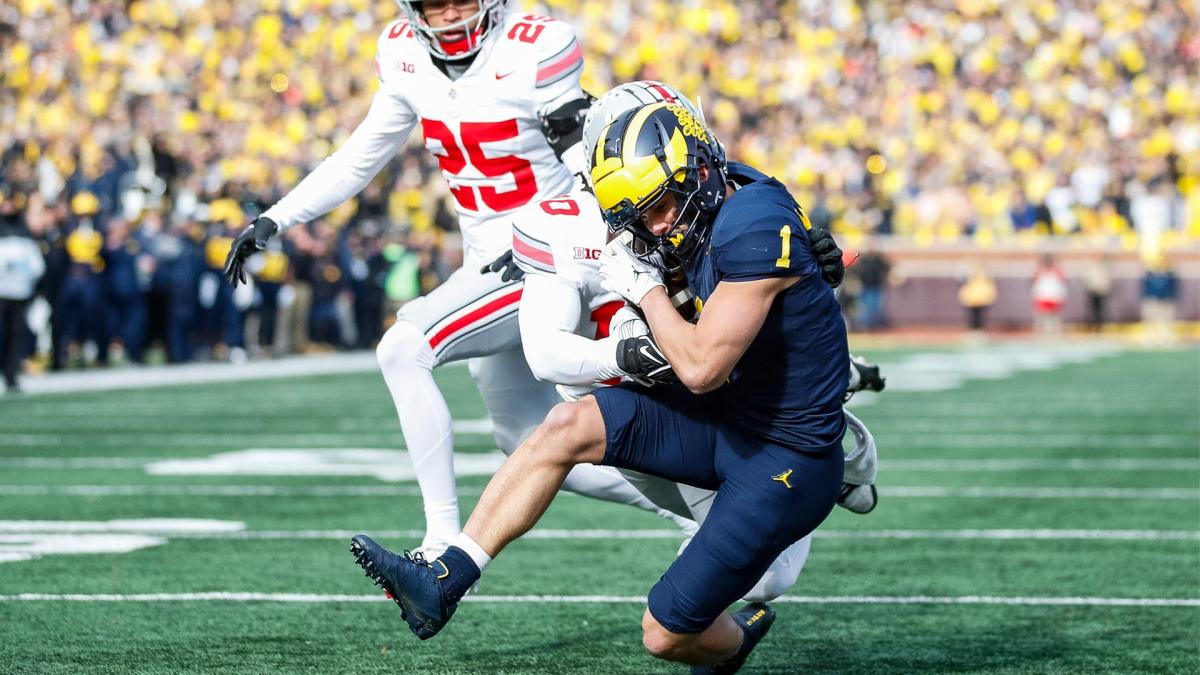Michigan Shows Unmatched Resolve in Win Over Ohio State
Four days before The Game, flashbulbs popped from the Stadium Boulevard bridge overlooking Michigan practice. Whether the photographer was an Ohio State spy—or just a local artist who enjoys taking photos of football practice from behind a tree and then scooting off when he realizes the flash is on—will remain one of history’s mysteries. But it doesn’t matter. For the third straight year, the picture is the same.
Michigan is a superior, tougher, more cohesive, better-coached team than Ohio State. The margin is not large, but it’s real, and the Wolverines know it.
No. 3 Michigan’s 30–24 victory over No. 2 Ohio State came down to the final minute at Michigan Stadium. But by that point, the Wolverines were without their head coach (Jim Harbaugh, who was suspended by the Big Ten), their best offensive lineman (Zak Zinter, who was carted off in the second half after what appeared to be a severe leg injury), and their most talented defensive player (cornerback Will Johnson, who also left the game via injury). Whether you think Harbaugh deserved his suspension or not, that is a lot for any team to overcome. This Michigan team is built to overcome it.
When somebody asked Michigan acting head coach Sherrone Moore afterward if his team put to rest the notion that it won because of illegally stolen signals, he said, “There’s a lot of thoughts and things I would like to say.” I’m guessing that one of things was that certain Big Ten head coaches amplified that story for their own benefit. But the best thing anybody at Ohio State could do for Michigan this month was actually believe the Wolverines beat them the last two years because of chicanery.
Harbaugh’s ethics are not Ohio State’s problem. His team is.
“You got guys who wanna put on the Louis (Vuitton), the $1,000 outfit—you wanna act hard but when we’re out there, they’re not hard,” Michigan receiver Roman Wilson said. “I see the film: You’re not tough. I don’t think I’m the toughest guy in the world, but I’m out there, I’m getting physical. I don’t think they wanted it like how I wanted it.”

Yes, yes: To the victors goes the right to be obnoxious about it. But how many Buckeyes fans would argue the point right now?
In its last three second halves against Ohio State, Michigan has scored 72 points and punted once.
The end of this game showed both how close and how far apart the programs are. Midway through the fourth quarter, OSU All-American Marvin Harrison Jr. scored on a crossing pattern to cut Michigan’s lead to 27–24. Michigan—which moved right tackle Karsen Barhart inside to replace Zinter and put Trente Jones in Barnhart’s spot—responded with a pounding 13-play drive. Ten of the plays were runs. Only one of the 13 plays went for more than six yards. But by the end, Michigan kicked a field goal and Ohio State had a minute to score a touchdown.
When you have Harrison, a minute can be plenty. He is probably the nation’s best player, a brilliant receiver who changes the geometry of a defense whether he gets the ball or not. Michigan’s best cornerback, Johnson, was out of the game. The Wolverines put Mikey Sainristil, a converted receiver who is listed at 5’10”, in press coverage on Harrison, who is 6’4” and faster than Sainristil. But Sainristil is the heart of the Michigan defense, a relentless nickelback who makes far more plays than anybody with his measurables should.
On the final meaningful play of the game, Ohio State quarterback Kyle McCord was drilled as he threw to Harrison, and Rod Moore—a former four-star safety from Ohio who was not recruited by Ohio State—intercepted it.
“I really felt like Rod was going to make the play,” Michigan quarterback J.J. McCarthy said. “I had this deep feeling in my gut that my twin’s gonna show up.”
McCarthy and Moore are numerical twins: Both wear No. 9. But on this team, everybody seems to see everybody else as a fraternal twin. All the stuff that isn’t supposed to work in college sports anymore is working at Michigan. Players stick around, even when they aren’t playing, because they don’t want to leave. The quarterback doesn’t care if the game plan is built around him, and so nobody else does. Linemen on both sides of the ball form units that play beyond their collective talent level.
Moore has done a magnificent job filling in for Harbaugh in the last three games, which included victories over Ohio State and Penn State. He should get a good head-coaching job this winter. But even he would say that taking over this team on short notice is not like taking over most teams. As Moore said Saturday, “I don’t lose sleep over these guys.” They’re always ready.
Michigan can certainly be beaten but seems incapable of splintering. When you have a team like that, you go for it on fourth-and-short with confidence, you let one of your running backs (Donovan Edwards) throw a deep pass from his own side of the field, and you believe that even a makeshift offensive line can impose its will when necessary.
“I don’t think we proved any of those guys wrong, or that was our intention,” McCarthy said when he was asked about the signal-stealing narrative. “We proved ourselves right. We know who we are.”
Of course, McCarthy was wearing a black Michigan vs. Everybody shirt when he said it. But the story in the Big Ten right now is not really Michigan vs. Everybody. It’s Michigan vs. Anybody, Especially Ohio State.
